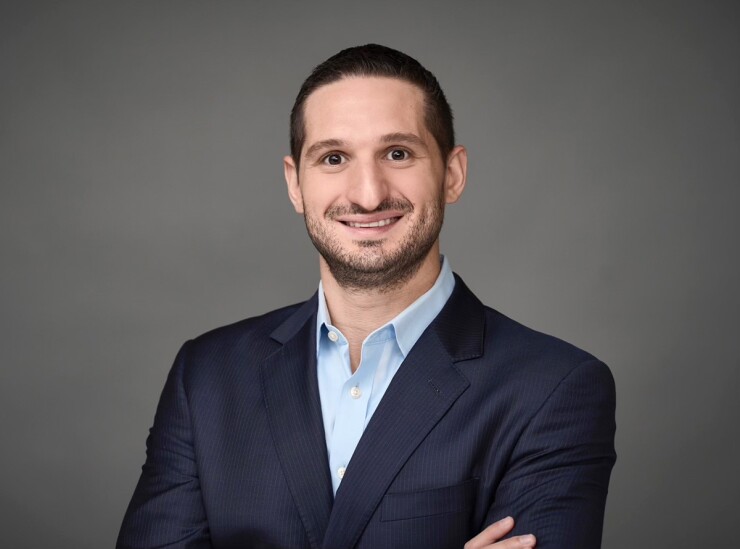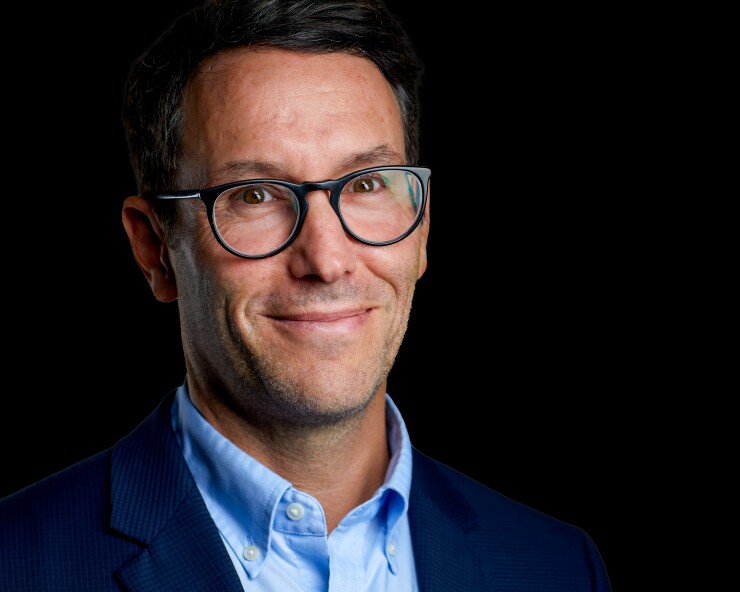Kristi Delongchamp likes to listen closely for what she calls "the little things" when appealing to prospective advisors.
When one potential hire said he was going on a family trip to Mexico, her team decided to follow him there — via the mail.
"We actually sent them a bottle of wine and a basket of sand toys for the kids to play with while they were out on vacation," said Delongchamp, the vice president of business development and relationship management at Ann Arbor, Michigan-based wealth management firm SPS Family. "That just helps set the tone so that they can see the difference in the culture that we have here."

In the market for advisor talent, that's the level of attention it sometimes takes to win a prospect over. Good pay is now just table stakes, Delongchamp said.
Financial advice has
Read more:
Thus, while recruiting in any industry can feel like dating, the stakes are especially intense in wealth management. Recruiters are under pressure to go all-out to win advisors who survived the winnowing process of those first few years in the industry. As a result, recruiting in 2023 can feel like an elaborate courtship process — and winning talent here means recruiters need to

"The first date is establishing, is there any sort of mutual fit before we even continue going into the weeds? Then the second and third date is more of the nuanced questions," Jason Diamond, an industry recruiter at Diamond Consultants, said in an interview.
From the broker-dealer space to the independent sphere, recruiting is different in 2023. That makes it all the more important for firms of all sizes, but especially smaller ones, to carefully consider the ways they will stay competitive and land qualified advisors they'll love.
Premiums and paychecks
True love isn't about money, or so they say. But
Firms this year have offered premiums to attract top talent, especially in the spring
"Deal probably continues to be the single biggest driver of recruiting — meaning transition deal or
Read more:
Increasingly, such deals also take the form of getting paid in equity for joining, Diamond added, noting that the rapid growth of some RIAs and rising valuations can make a stake in a firm a deciding factor.
"Obviously, if you go to a Morgan Stanley, for example, there's not going to be equity in the deal. But independent firms have a lot of flexibility in that regard. And it can be a real pot sweetener for advisors who believe in the story of the firm."

For Neil Turner, the chief revenue officer of NewEdge Capital Group and co-CEO and co-founder of RIA NewEdge Advisors, equity is much more important today than it was a few years ago for attracting new talent.
"In the past, advisors who were considering their independent options typically were not interested in upfront capital or monetization," he said. "You're getting a lot of questions now from advisors on the move as to whether or not they can take equity or trade equity in their firm with the parent firm. So
Smaller and independent firms should be prepared to offer transition assistance "in the form of capital," Turner said.
A generous compensation package is especially important when trying to attract
"It's about being respected, being valued and being paid well," said Wilson. Professionals on her platform are looking to be "paid to the level of professionalism and certifications that they have."
Wilson also said that compensation is important because advisors who feel undervalued at work are likely to pursue roles at firms where they are more appreciated.
"Going somewhere where … you're looked at as an equal partner in all different ways" is key, Wilson said. "That's something that probably has gotten lost somewhere along the line in the industry, especially when it comes to sometimes

Whether it's asking a
Job seekers have to consider, "Hey, does this place make sense for my clients and also, ultimately, make sense for my own personal wealth gain?" Wilson said.
Read more:
Firms that are serious about not only attracting but retaining talent should be clear with their compensation offers, Wilson said. Many diverse advisors have told her about being promised a certain type or level of pay that never materialized.
Failing to deliver on promises can damage a firm's reputation in the industry and make it harder for it to attract and keep
"If companies are able to be as transparent as possible, I think that's very helpful," she said.
Sweep them off their feet
After pay, next in importance to advisors is "culture" — the broad and somewhat nebulous term frequently evoked in recruiting conversations — which experts say
Company culture can be reflected in the tactics firms use to woo advisors. Bigger firms might fly out executives to meet a recruit and sell them on the firm's offerings, but smaller firms can hold their own with courtship strategies that may be more budget-friendly but just as memorable.
At SPS Family, Delongchamp said she tries to be "fully dialed into the conversation" with candidates. She actively listens to potential recruits and jots down notes from the conversation, then follows up with small personalized messages — it could be a news story or something about a football game.
"That's what's going to make you stand out, versus if you've just got a standard template that you read from, where you're just like, 'We've got this, this, this and this,'" she said.
Delongchamp said she also sends "bumpy mail" packages with gifts like a golf tee to get the recipient curious and excited about what could be inside. She tailors the gifts not just to the person but also to the situation. Her team once sent flowers to a recruit's wife who had just given birth.
"Because we knew him being away was going to be a feat — when you have a newborn and you're taking away the No. 2 spouse." To Delongchamp, these are the moves that help differentiate her firm from others on the market that might appear the same in terms of pay and benefits.

For Kevin Reed, the executive vice president and the president of the Private Client Group at Philadelphia-based regional firm Janney Montgomery Scott, it's about showing potential recruits that the firm is putting them and their client relationships at its center, with consistent messaging around that throughout the recruiting process. With
What really seals the deal for many prospects, Reed said, is
When it comes to recruits' in-person visits, Reed said he thinks that they "hope that it's as good as they've heard. I think they're very anxious when they come because they're hoping to prove that out.
"What is most important for your practice? What is most important for your clients?" Reed said the team will ask them. "It could be a piece of technology, it could be a service, it depends. But we want to make sure that we curate this experience so they get a sense of what we offer that is very important to their future. … It becomes authentic and almost tangible to them."
Read more:
Delongchamp cited a similar level of preparation in her own recruits' home office visits.
"We do a prep ahead of time with the presenters so that they get a good overview of the advisor. The worst thing that somebody can do at one of my recruiting meetings is come in and go, 'OK, so tell me about you. Tell me where you're at, tell me what your current firm is, what your book of business is.' That infuriates me. Because it's, again, about prepping yourself and planning and making sure that you're prepared," Delongchamp said.
One no-no, though, when trying to love-bomb potential hires? Trash talking competitors, Diamond said.
"When managers make the comment, like, 'Oh, this is the only place to do business, or this is the only place you're going to be successful,' it comes across as tone deaf, and a lot of times, it annoys advisors," he said.
It's best to focus on showing up as your best self to a recruit.
The other big mistake firms make, Diamond said, is failing
"Firms have their own agenda; a lot of times that agenda involves getting advisors in the door as quickly as possible," he said.
But if an advisor feels they aren't being heard, they'll go cold on the firm.
"If an advisor asks you a question about your alternative investments platform, and you dodged the question and answer with how strong your managed account platform is, that's missing the mark," he said. "But we see it a lot."
Read more:
Seeking new (business) arrangements
Sometimes, an advisor simply outgrows a relationship — and they may be ripe for a competitor to scoop up, if that competitor can show that they would provide a better fit.
As the industry
"For some firms, maybe it's referrals from an investment bank or from a custodian or from a commercial bank. Referrals are a popular one, or maybe it's an incredible investment platform that I can take advantage of that will enable me to grow," Diamond said.

Mark Contey, senior vice president of business development for LaSalle St. Securities, agreed that deal-making can be a major "catalyst" for an advisor to leave.
"There needs to be something materially wrong with their relationship with their current firm. And that could be change of management and change in ownership. There's a lot of that going on in the industry," Contey said.
He added that the firm charging advisors too much in costs to provide support, and the level of service offered to help them serve their clients, are also common factors that drive them away.
Read more:
"The service model has become more degraded, meaning reduced service to the advisor. It takes longer to get an account opened or a compliance item approved or whatever needs to be done for the client or for the advisor that day," Contey said.
Long-term compatibility
At the end of the day, like all relationships, the one between a firm and its recruits has to be reciprocal.
For Chris Powers, senior vice president and managing director of relationship development

First and foremost, Powers wants to hire advisors who are thinking beyond their paychecks.
"If you're just worried about compensation, that means you're worried about yourself and not your clients or the client experience," he said. "You should be fairly compensated, but if that's the sole driver of your decision, that's a red flag for us."
Being solely compensation-focused also means an advisor might only be in it for the short term and jump ship if a better offer comes along, he added.
As

He asks recruits what they are proud of and about their approach to managing a team.
"It gives you a pretty good lens into whether or not they're focused on building their team or building themselves," Harris said.
"We want to build teams more so than we want — I'm just going to say (it) — egos running around. We're not huge fans of that," Harris said. "Clients are absolutely better served by teams. And so we really strive to find team players."
To convey the idea of togetherness at his firm, Harris also often invites recruits on a boat cruise around a lake to get to know them in a relaxed environment. He hopes that doing so will show them his firm knows how to "have authentic fun."
"I think that makes a difference in this day and age because, again, anybody who wants a long career wants an experience. They want an incredible journey. … If they resonate with the way we approach life, which is hopefully a lot of fun, hopefully a lot of good work, for the purpose of doing right by our clients, then usually it's a pretty good fit."












